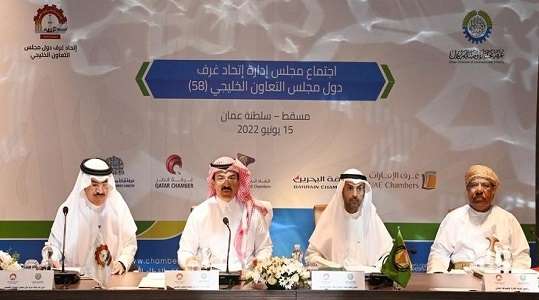On the sidelines of the 58th session of the Federation’s Board of Directors meeting in the Sultanate of Oman, the heads of the Federations of the Chambers of the Gulf Cooperation Council met the Secretary-General of the Gulf Cooperation Council, Dr. Nayef Al-Hajraf, as a number of issues related to the Gulf private sector were addressed, which enhance ways of cooperation between them, the most important of which is the issuance of a unified guide for GCC citizens to invest in the GCC states, including special conditions and procedures for the import and export process between the GCC states, and the role of the Gulf private sector in the search for alternative resources for basic products (wheat - oils), in light of the expected food crisis as a result of the Russian-Ukrainian military conflict.
The meeting with Al-Hajraf touched on the effects of inflation resulting from the rise in oil prices, the tense conditions globally and their repercussions on economic and commercial activity among the GCC states, and the need to take coordinated economic policies to confront it. The necessity of concluding a free trade agreement between the GCC countries and India was discussed, especially in light of the current food crisis that the world is witnessing. The General Secretariat of the Federation of Gulf Chambers stressed the importance of directing support to encourage the Gulf private sector to increase investment in agriculture and food industries. The participants in the meeting expressed their willingness and great welcome to make ways of cooperation with the Gulf private sector, and to seek to establish the desired Gulf unity by 2025.
The meeting of the Council of the Federation of Gulf Chambers included a presentation of the draft proposal for the new statute for the union, and a review of the outcomes of the periodic consultative meeting between the Gulf trade ministers. The Council approved the annual report, which included the economic harvest of the Gulf Cooperation Council countries, by knowing the expected performance on the features and prospects of economic performance from 2020 to 2023, and economic studies and reports that dealt with the expected future effects of the Corona pandemic on the Gulf private sector, and strengthening the relationship of the General Secretariat of the Union with Gulf organizations, bodies, institutions and centers, through holding economic events.
Source (Al-Rai Kuwaiti Newspaper, Edited)

